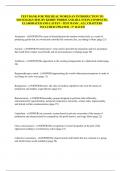TEST BANK FOR THE REAL WORLD AN INTRODUCTION TO
SOCIOLOGY 8ED. BY KERRY FERRIS AND JILL STEIN-COMPLETE,
ELABORATED AND LATEST - TEST BANK . ALL CHAPTERS
INCLUDED UPDATED - 5* RATED
Alienation - (ANSWER)The sense of dissatisfaction the modern worker feels as a result of
producing goods that are owned and controlled by someone else, according to Marx (page 23)
Anomie - (ANSWER)"Normlessness"; term used to describe the alienation and loss of purpose
that result from weaker social bonds and an increased pace of change (page 20)
Antithesis - (ANSWER)The opposition to the existing arrangements in a dialectical model (page
24)
Beginner’s mind - (ANSWER)Approaching the world without preconceptions in order to
see things in a new way (page 11)
Bourgeoisie - (ANSWER)Owners; the class of modern capitalists who own the means of
production and employ wage laborers (page 23)
Bureaucracies - (ANSWER)Secondary groups designed to perform tasks efficiently,
characterized by specialization, technical competence, hierarchy, written rules, impersonality,
and formal written communication (page 25)
Capitalism - (ANSWER)An economic system based on private ownership of the means of
production and characterized by competition, the profit motive, and wage labor (page 22)
Class consciousness - (ANSWER)The recognition of social inequality on the part of the
oppressed, leading to revolutionary action (page 23)
Collective conscience - (ANSWER)The shared morals and beliefs that are common to a group
and which foster social solidarity (page 20)
,Collective effervescence - (ANSWER)An intense energy in shared events where people feel
swept up in something larger than themselves (page 20)
Communism - (ANSWER)A political system based on the collective ownership of the means of
production; opposed to capitalism (page 22)
Conflict - (ANSWER)Generated by the competition between different class groups for scarce
resources and the source of all social change, according to Karl Marx (page 22)
Conflict theory - (ANSWER)A paradigm that sees social conflict as the basis of society and
social change, and emphasizes a materialist view of society, a critical view of the status quo, and
a dynamic model of historical change (page 22)
Conversation analysis - (ANSWER)A sociological approach that looks at how we create
meaning in naturally occurring conversation, often by taping conversations and examining them
(page 31)
Critical theory - (ANSWER)A contemporary form of conflict theory that criticizes many
different systems and ideologies of domination and oppression (page 24)
Culture shock - (ANSWER)A sense of disorientation that occurs when you enter a radically new
social or cultural environment (page 13)
Deconstruction - (ANSWER)A type of critical postmodern analysis that involves taking apart or
disassembling old ways of thinking (page 34)
Dialectical model - (ANSWER)Marx’s model of historical change, whereby two extreme
positions come into conflict and create some new third thing between them (page 23)
Disenchantment - (ANSWER)The rationalization of modern society (page 26)
,Dramaturgy - (ANSWER)A theoretical paradigm that uses the metaphor of the theater to
understand how individuals present themselves to others (page 30)
Dysfunction - (ANSWER)A disturbance to or undesirable consequence of some aspect of the
social system (page 21)
Empirical - (ANSWER)Based on scientific experimentation or observation (page 20)
Ethnomethodology - (ANSWER)The study of "folk methods" and background knowledge that
sustains a shared sense of reality in everyday interactions (page 31)
Eurocentric - (ANSWER)The tendency to favor European or Western histories, cultures, and
values over other non-Western societies (page 28)
False consciousness - (ANSWER)A denial of the truth on the part of the oppressed when they
fail to recognize the interests of the ruling class in their ideology (page 23)
Feminist theory - (ANSWER)A theoretical approach that looks at gender inequities in society
and the way that gender structures the social world (page 24)
Ideology - (ANSWER)A system of beliefs, attitudes, and values that directs a society and
reproduces the status quo of the bourgeoisie (page 23)
Iron cage - (ANSWER)Max Weber’s pessimistic description of modern life, in which we
are caught in bureaucratic structures that control our lives through rigid rules and rationalization
(page 26)
Latent functions - (ANSWER)The less obvious, perhaps unintended functions of a social
structure (page 21)
Macrosociology - (ANSWER)The level of analysis that studies large-scale social structures in
order to determine how they affect the lives of groups and individuals (page 15)
, Manifest - (ANSWER)Functions the obvious, intended functions of a social structure for the
social system (page 21)
Means of production - (ANSWER)Anything that can create wealth: money, property, factories,
and other types of businesses, and the infrastructure necessary to run them (page 22)
Mechanical solidarity - (ANSWER)Term developed by Emile Durkheim to describe the type of
social bonds present in premodern, agrarian societies, in which shared traditions and beliefs
created a sense of social cohesion (page 18)
Microsociology - (ANSWER)The level of analysis that studies face-to-face and small group
interactions in order to understand how they affect the larger patterns and institutions of society
(page 14)
Midrange theory - (ANSWER)An approach that integrates empiricism and grand theory (page
34)
Modernism - (ANSWER)A paradigm that places trust in the power of science and technology to
create progress, solve problems, and improve life (page 33)
Organic solidarity - (ANSWER)Term developed by Emile Durkheim to describe the type of
social bonds present in modern societies, based on difference, interdependence, and individual
rights (page 20)
Paradigm - (ANSWER)A set of assumptions, theories, and perspectives that make up a way of
understanding social reality (page 17)
Positivism - (ANSWER)The theory, developed by Auguste Comte, that sense perceptions are the
only valid source of knowledge (page 17)
Postmodernism - (ANSWER)A paradigm that suggests that social reality is diverse, pluralistic,
and constantly in flux (page 33)




